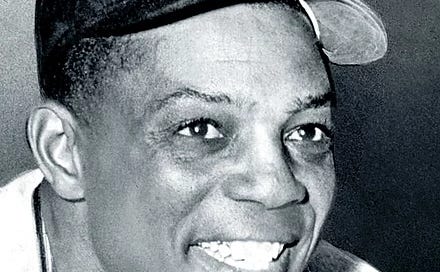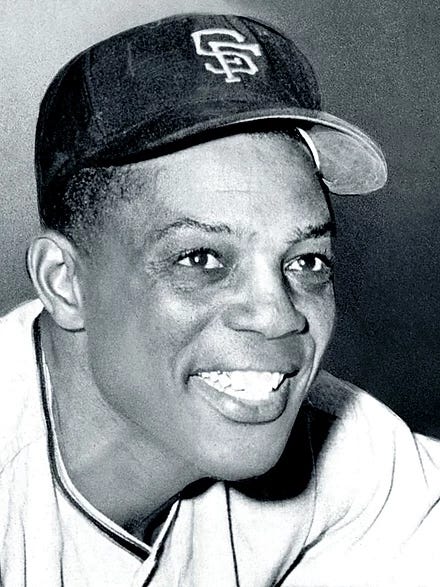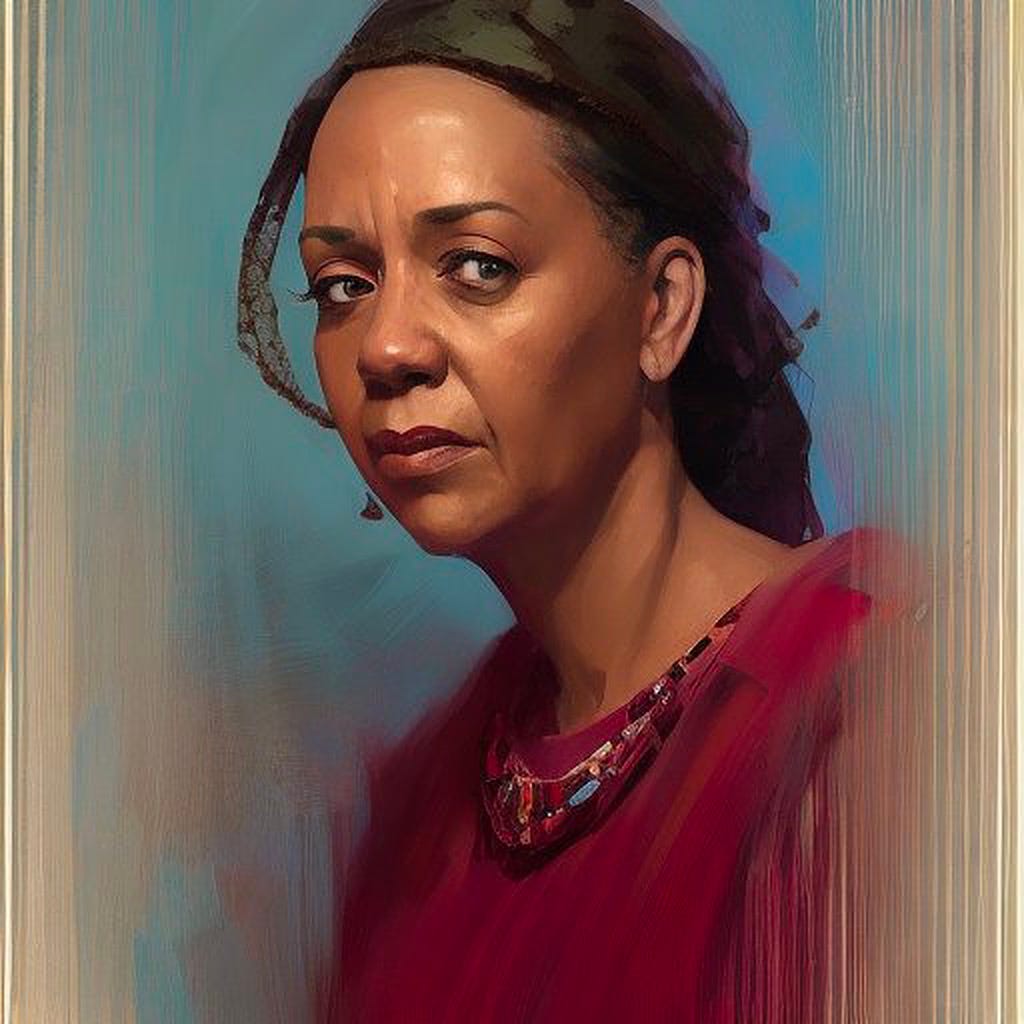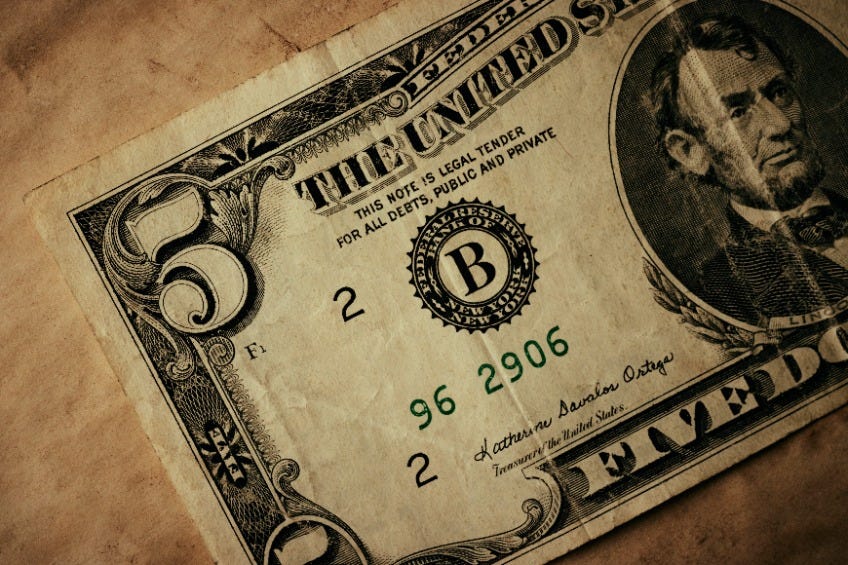Today In Black History: Willie Mays
The Greatest Baseball Player in History
Issue #644 Today In Black History, Thursday, June 20, 2024
Help us to reach our June 2024 goals: +125 total subscribers and +75 paid subscribers:
Please share and subscribe to help us grow this publication.
If you like us, REALLY like us, please click the “Like” button at the end of this post!
Also, please scroll to the end of this post for other ways to financially support us and We Are Speaking with our books and courses.
We appreciate your support!
Today’s Black History WOW!
Willie Mays with the San Francisco Giants in 1961
Willie Mays, often called "The Say Hey Kid," is widely regarded as one of the greatest baseball players in history. Born on May 6, 1931, in Westfield, Alabama, Mays began his professional baseball career in 1948 in the Negro Leagues playing for the Birmingham Black Barons before joining the Major Leagues with the New York and San Francisco Giants in 1951.
Mays was known as a “five-tool” player, meaning he was a position player who had great skill in all the tools or basic skills: hitting for average, hitting for power, base running and speed, throwing, and fielding.
Soon after the 1951 season ended, Mays learned the United States Army had drafted him to serve in the Korean War. Before he left to join the Army, Mays played the first few weeks of the 1952 season with the Giants. Mays missed about 266 games because of his military service. Discharged on March 1, 1954, he reported to the Giants' spring training camp the following day.
In his first Major League Baseball (MLB) year with the New York Giants, Mays won the Rookie of the Year Award, helping the Giants win their first pennant in 14 years. In 1954, he won the National League Most Valuable Player (MVP), while leading the NY Giants to their last World Series title before the team moved to San Francisco.
In Game 1 of the 1954 World Series, Mays made one of the most famous baseball plays of all time with his over-the-shoulder catch right at the fence. This is now known as "The Catch" and is often considered one of the greatest defensive plays in baseball history.
Over his 22-year career, Mays played for the New York/San Francisco Giants and the New York Mets, establishing himself as a 24-time All-Star and a 2-time National League MVP. He was known for his incredible batting average, excellent fielding, and base-running ability. These attributes earned him 12 Gold Glove awards and two National League batting titles.
Mays's 24 appearances on an All-Star Game roster are tied with Stan Musial for second all-time, behind only Hank Aaron's 25 appearances.
Unlike other black athletes such as Jackie Robinson, Mays tended to remain silent on racial issues, refraining from public complaints about discriminatory practices that affected him. Robinson once accused him and some of his teammates of not doing enough for the civil rights movement. Hank Aaron wished Mays had spoken out more on racial issues. However, Mays believed his job was to play baseball, not talk about social issues. "I'm a ballplayer. I am not a politician or a writer or a historian. I can do best for my people by doing what I do best."
The jersey number for Willie Mays, #24, was retired twice, making him only the 14th player or manager to have their number retired by two teams.
Willie Howard Mays, Jr. was inducted into the Baseball Hall of Fame in 1979 in his first year of eligibility. Throughout his career, he amassed numerous records and accolades, including 660 home runs, 3,283 hits, and 1,903 RBIs. He was also a member of the Major League Baseball All-Century Team.
In 1976, President Gerald Ford invited Mays to the White House State Dinner where he met British Queen Elizabeth II.
In 2015, President Barack Obama awarded the Presidential Medal of Freedom to Willie Mays.
In 2017, Major League Baseball renamed the World Series MVP Award the Willie Mays World Series MVP Award.
Mays was awarded honorary degrees by Yale University, Dartmouth College, and San Francisco State University.
Willie Mays died of heart failure in Palo Alto, California on June 18, 2024, at the age of 93.
Today In Black History
In 1863, the new state of West Virginia was admitted to the Union as the 35th state, becoming the only state to secede from the Confederacy. West Virginia broke from the Confederate State of Virginia, which at the time, was the largest state in the Confederacy.
In 1871, the Ku Klux Klan trials began. The U.S. Justice Department had recently been formed to primarily deal with the KKK, indicted 930 whites, and tried and convicted 243 people. The majority of those arrested and tried were doctors, lawyers, ministers, college professors.
In 1903, Charlotte Mannya Maxeke became the first native African to graduate from a U.S. college when she received her degree from Wilberforce University in Ohio.
In 1911, the NAACP, which was founded in 1909, was incorporated in New York.
In 1926, Dr. Mordecai Wyatt Johnson became the first Black president of Howard University.
In 1943, a three-day race riot took place in Detroit, Michigan, exacerbated by racial tensions and housing shortages with the nearly 400,000 African-American and white Southern migrants into the City between 1941 and 1943. The riot was finally suppressed by using 6,000 federal troops after 35 people were killed.
In 1943, the National Congress of Racial Equality (CORE) was organized.
In 1960, the Federation of Mali and Senegal became independent of France.
In 1960, Harry Belafonte became the first African American to win an Emmy when he was awarded for his variety special, “Tonight with Harry Belafonte.”
In 1967, a federal court in Houston, Texas, convicted Muhammad Ali of violating the Selective Services Act by refusing induction into the Armed Services. He was sentenced to five years in prison and fined $10,000. He remained free during his appeals process, and on June 28, 1971, Ali’s conviction was unanimously overturned by the Supreme Court in an 8-0 decision.
In 1979, President Jimmy Carter announced that he had 32 solar panels installed on the roof of the White House. His successor, President Ronald Reagan had them removed.
In 1988, the Supreme Court upheld a law that made it illegal for private clubs to discriminate against women and minorities.
In 1990, attorney and anti-apartheid activist Nelson Mandela landed in New York City to begin his U.S. tour after being released from prison after 27 years.
Our paid subscribers are encouraged to discuss this post in our W.A.S. Chat Community.
Join Pamela Hilliard Owens’s subscriber chat
Available in the Substack app and on web
You are also welcome to view “We Are Speaking” in Substack Notes. You can also read other Substack publications without subscribing to them when you join Notes.
This post is free to read for three days. To have access 365/24/7 to our full archive, comment on our posts, and financially support “We Are Speaking” for no more than $5 per month, please subscribe at the paid level.









